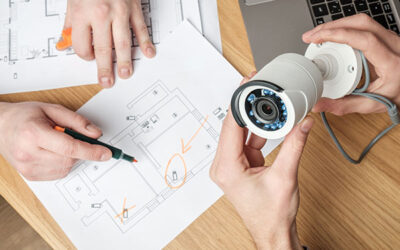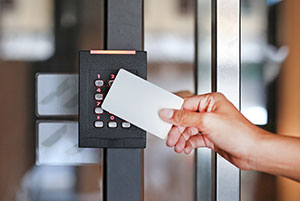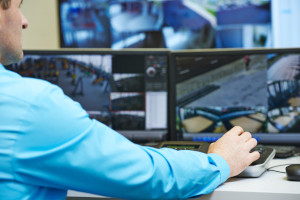While many business owners are content to keep their premises safe with security cameras and alarm systems, others desire security measures that offer a more immediate response. Fortunately, this is where security patrolling comes in.
Security patrols offer an on-site presence that provides greater protection of your premises and ensures a trained security professional will be there in the event of a break-in or similar event that poses a threat to your employees and valuable assets.
With this in mind, this post explores the role of security patrolling and the benefits it offers your business.
What Is Security Patrolling?
Let’s start by defining what a security patrol is. A patrol involves a security guard periodically making their way around a defined perimeter – in this case, your premises. Their purpose is to ensure everything is as it should be, detect anything unusual, and prevent criminal activity.
Let’s look into the role of security patrols in greater detail.
What Is the Purpose of Patrolling in Security?
The main purpose of patrolling in security is to keep a premises and, more specifically, the people and assets within it, safe and secure. The main way this is achieved is through the detection and prevention of crime, which occurs in two ways.
Firstly, as a security guard patrols a premises, their situational awareness increases. They develop a better idea of what’s happening on the property at any given time, if there is any suspicious activity, and if there are any vulnerabilities that need to be addressed. Secondly, a security guard’s presence helps to deter criminal activity. Upon seeing a property has a security patrol, potential intruders are likely to choose an alternative – easier – target.
Consequently, a security guard protects a business’ employees from the threat of assault and harassment, emergency situations, hazardous materials, and other physical threats. Security guards provide them with a safe environment in which to work or, in some cases, live.
Similarly, a security guard protects a business’ assets from theft, criminal damage, fire, floods, and any other manner in which they may become lost or damaged. As a result, they also protect a company’s reputation, standing within their industry, and, ultimately, their bottom line.
What Makes Patrolling a Crucial Element in Protecting Your Valuable Assets?
A security guard has several key responsibilities that make them an essential part of protecting your valuable assets:
- Patrolling and Monitoring: Security guards often represent the first line of defence against illegal activity and threats of all kinds. The most important method of achieving this is periodically patrolling your property. By regularly making the rounds, a security patrol will prevent theft, criminal damage, trespassing, and other unexpected incidents. Security guards are trained to assess, on the spot, if something seems out of the ordinary.
Similarly, when not physically patrolling a property, security operators can monitor your premises using surveillance equipment. This includes paying attention to footage from security cameras situated around the property, as well as responding to any alarms that could have been triggered.
Security Guard watching security monitor.
However, it’s important to stress that security patrols don’t just wait for something to happen: a large part of their job is anticipation and prevention. As you’ll see as we progress through this post, guards need to be proactive in their duties to best protect the premises and the people and assets contained within it.
- Controlling Access to Premises: One of the most fundamental ways security guards protect a property is by controlling access to it. This involves checking people’s IDs and subsequently permitting or refusing entry, ensuring that only authorised personnel, such as employees, visitors, outside contractors, residents, etc., are permitted access to the property.
- Inspecting And Maintaining Equipment: Security guards can be asked to inspect surveillance equipment and make sure everything is operational: carrying out maintenance, troubleshooting procedures, and arranging repairs when necessary.This may also extend past security equipment to other equipment specific to particular businesses. For example, you may own a transport company and want all trucks checked to ensure they are locked and sealed in the compound. Similarly, security guards need to check the status and integrity of access points around the premises) such as doors, gates, fences, etc.
- Communication: Clear and effective communication is an integral part of a security patrol’s job. This includes communicating with on-site personnel, people attempting to access the premises, the client, and the security company they represent. Also, crucially, they need to know how to communicate with suspected and actual criminals – to deter crime or successfully stop a crime that’s in progress.
- Reporting: Reporting is an integral part of communication. A security guard should record their daily observations, particularly any incidents that took place during their shift, and report them per the established security protocols. This not keeps the relevant parties informed about what’s happening on site but will present ways in which security measures can be improved going forward.
- Escalation: Whenever the security guards aren’t equipped to handle certain situations, it’s their duty to contact the appropriate authorities, such as the police or fire department, as soon as possible to ask for additional assistance. Better still, the security guard acts as the ‘point person’ – a knowledgeable resource and point of contact for the authorities or emergency services when an incident takes place.
Is It Practical to Have Security Guards on Patrol If You Have a Monitoring System Installed?
It is indeed practical to have security guards on patrol if you have a security monitoring system in place. This is because a security patrol complements a monitoring system as opposed to replacing it – they work together.
Firstly, a monitoring system helps security guards to do their jobs more effectively. They notify them of incidents, whether via security camera footage or when an alarm is triggered, so they can get to that location as soon as possible.
In addition, security guards can perform functions that a monitoring system can’t – namely, providing an immediate response to an event. Let’s say, for instance, that someone is trespassing on your property. Not only will the security guard become aware of this but they can instantly take steps to put an end to it, such as communicating with the intruder and asking them what they’re doing.
Subsequently, they can investigate how the intruder gained access to the property and take the necessary steps to prevent it from happening again. In contrast, while the event can be seen on a monitoring system, some time will elapse before there is a response.
Security guards also provide value by being able to assist on-site personnel. They can, for instance, be a point of contact for employees if they notice something wrong, be it someone unfamiliar on the premises, a fire, leak, electrical issues, etc. Similarly, on a residential property, such as an apartment complex, security guards can help residents gain access to the property if they’ve lost their keys, etc.
What Is the Most Effective Method of Patrol?
Broadly speaking, there are two methods of patrol: foot and vehicle patrols.
Foot patrols involve the security guards walking around the premises to carry out their patrol.
Benefits include of foot patrols include:
- Enhanced situational awareness: more time and scope to assess what is going on around them
- Ability to inspect situations in closer detail
- Better ability to interact with on-site personnel, members of the public, and suspicious individuals
Drawbacks of foot patrols include:
- Takes more time to cover large properties
- Walking requires physical exertion, i.e., guards will get tired quicker
- Environmental exposure: increases the rate of fatigue and increases the chance of illness.
Vehicle patrols involved the security guard making their rounds with the assistance of a vehicle, such as a car, motorcycle, bicycle, etc.
Benefits of vehicle patrols include:
- Ability to patrol a larger area or perimeter – and in less time
- Vehicles can be equipped with technologies that enhance the guard’s ability to perform their job, such as a GPS tracker and high-powered lighting
- Environmental protection during the patrol
Drawbacks of vehicle patrols include:
- Reduces situation awareness, i.e., the ability to use some of the human senses to get a better idea of what’s going on
- Increased cost: vehicle, fuel, maintenance, etc.
How Should a Security Patrol Be Conducted?
For security patrolling to have maximum effectiveness, it should be conducted in a certain manner. This section looks at some best practices for carrying out a security patrol.
Establish Patrol Policies for the Premises
First and foremost, a security patrol needs to be properly organized in advance. More specifically, the security guards tasked with patrolling the premises need to have a clear understanding of what their duties are. This includes:
- How they are to patrol, i.e., on foot or in a vehicle
- Where they should patrol
- When and how often they should carry out their patrols
- The equipment they’re expected to maintain, whether it’s security monitoring equipment or otherwise
- If there are doors or windows to be locked, fire exits or pool areas cleared.
Randomise Times and Routes When Making Rounds
It’s crucial that security patrols aren’t predictable. For instance, a security guard shouldn’t carry out their patrols at the same time every hour. Patrols need to have an element of unpredictability to them and should constantly be shaken up. This prevents criminals who may be scoping out a premise’s security procedures, with the aim of breaking and entering, to pick up on the security patrol’s pattern – so, in other words, potential vulnerabilities. This, in and of itself, is an additional security deterrent.
Wearing Uniforms
Security guards should wear properly labelled uniforms to distinguish them from other onsite personnel, customers, and other members of the public. Plain uniformed patrols open the door for them being imitated by canny criminals.
Also, while one the subject of uniforms, it’s important that guards be supplied with, or mandated to wear, uniforms that are fit for purpose for the environment they work in and the scope of their duties. This includes clothing that protects them from environmental exposure and, for foot patrols, wearing shoes that are comfortable enough to allow walking for the entirety of their shift.
Marked Patrol Vehicles
Similarly, security companies should feature clear branding, or markings, on their vehicles and ensure that they are registered and licensed. They offer the advantage of being an immediate deterrent. Unmarked vehicles, in contrast, could suggest that the business doesn’t have the resources to enforce effective security – which makes them a softer target to opportunistic criminals.
Understand Emergency Procedures
When security guards knowing the proper process for dealing with emergencies and when to escalate to the authorities, this can dramatically improve response time. For instance, security guards need to know what to do in the event of there being an intruder on the premises, as well as how to proceed in the event of a fire, severe flooding, etc.
Keep A Safe Distance During a Conversation
A security guard needs to maintain a safe distance when dealing with members of the public. This includes remaining at a safe distance throughout the encounter, consistently keeping the person in their view, and paying attention to their movements. As we alluded to earlier in this post, this is where the need for effective communication comes in, as the ability to communicate clearly allows a security guard to do their job while still keeping a safe distance.
Summary
Security patrols are such an effective security measure because, when executed correctly, they’re a potent deterrent and provide an instant response. Not to mention the fact that having a security guard on-site provides a host of additional benefits, such as maintaining your monitoring equipment and making employees feel safe while they work.
If you’re considering security patrolling for your business, contact us for a free onsite inspection, quote, and patrol recommendations tailored to specifically to your company.




